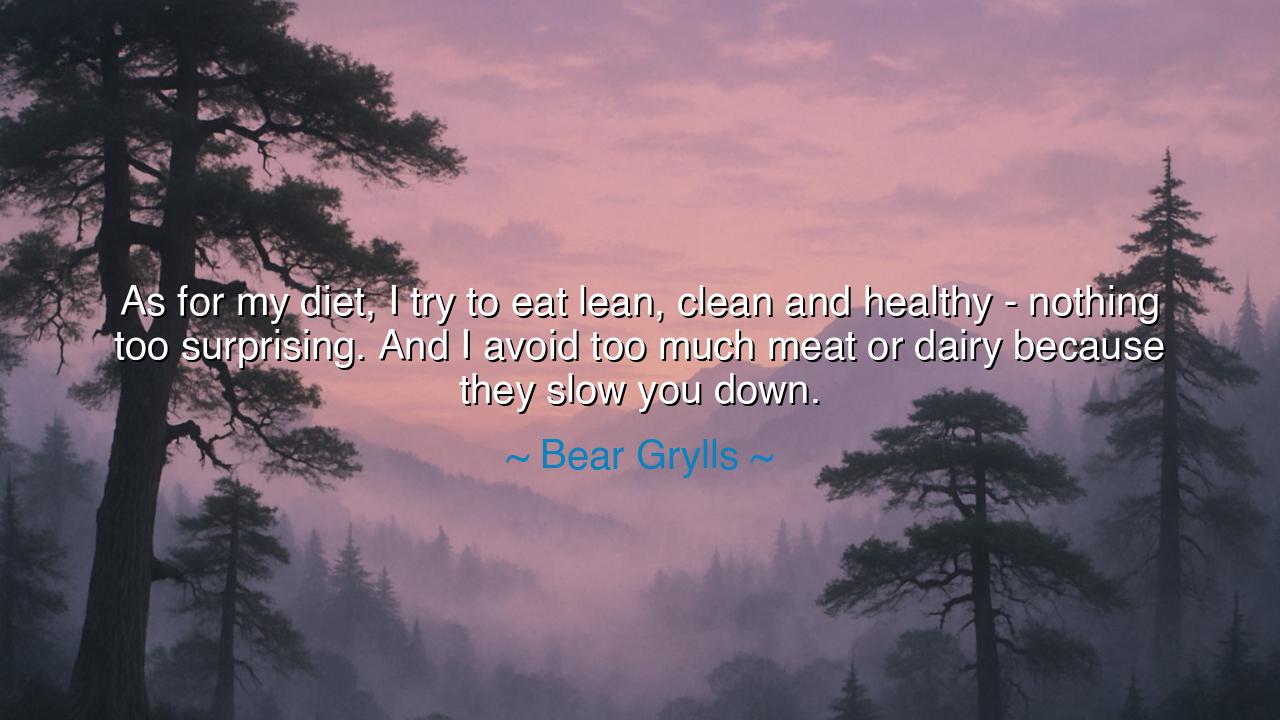
As for my diet, I try to eat lean, clean and healthy - nothing
As for my diet, I try to eat lean, clean and healthy - nothing too surprising. And I avoid too much meat or dairy because they slow you down.






In the words of Bear Grylls, the adventurer whose life has been a testament to endurance and purpose, we find both simplicity and strength: “As for my diet, I try to eat lean, clean, and healthy—nothing too surprising. And I avoid too much meat or dairy because they slow you down.” Though spoken plainly, these words carry the wisdom of a man who has lived on the edge of the wild and looked deeply into the truths of survival. Beneath their modest surface lies a powerful philosophy—that what we take into our bodies shapes not only our strength, but our clarity, our spirit, and our readiness to face the unknown.
To live “lean, clean, and healthy” is more than a choice of food; it is a discipline of life. Grylls, forged by hardship and adventure, knows that the body is both a vessel and a weapon—it must be kept light, strong, and pure to endure the trials of the earth. His avoidance of excess, of heaviness from meat and dairy, speaks not of rejection but of refinement. He understands, as the ancients did, that strength does not come from fullness, but from balance, and that to carry unnecessary weight—of body or spirit—is to hinder the journey. His diet is not a fad, but a reflection of a deeper truth: that the warrior, the seeker, and the wanderer must be unburdened to travel far.
The ancients themselves lived by such wisdom. In the gymnasia of Greece, the athletes who prepared for the Olympic games followed diets of simplicity and moderation. They ate grains, figs, olives, and honey—foods that nourished the body without dulling its edge. Pythagoras, the philosopher and mystic, taught that eating light purified not only the body but the mind, allowing a man to think more clearly and act more swiftly. He warned that the overconsumption of flesh made the soul heavy, binding it to the earth and clouding its reason. Bear Grylls, in his modern way, continues this lineage of wisdom: he speaks of lightness as freedom, of nourishment as clarity, and of eating not to indulge but to serve the higher purpose of life.
His words, too, reveal a lesson learned from nature itself. In the wild, every creature knows what sustains it and what weakens it. The wolf eats just enough to hunt again; the eagle fasts between its kills, and the deer grazes gently upon what the earth provides. The wilderness punishes excess and rewards balance. Grylls, who has lived among these lessons, understands that the same laws apply to man. When the body is overfed, the spirit is dulled; when it is cared for wisely, the spirit awakens. Thus, to eat cleanly is not merely to care for the flesh, but to honor the sacred connection between body and soul.
Consider the story of the Spartan warriors, whose discipline was legendary. They were trained not only in arms and combat but in restraint. Their meals were sparse but strong, their hearts fierce yet clear. They believed that the body, when freed from indulgence, became a vessel of willpower and focus. When Bear Grylls speaks of avoiding foods that “slow you down,” he invokes this same ancient virtue: that of temperance—the art of mastery over desire. For it is not only food that slows us down, but all excess—of comfort, of wealth, of distraction. The wise man eats lightly, lives simply, and thus moves swiftly through the challenges of life.
Yet there is humility, too, in Grylls’s words. “Nothing too surprising,” he says, acknowledging that truth is often simple, yet difficult to practice. The modern world worships complexity—counting calories, chasing diets, multiplying rules. But Grylls returns to the ancient principle of moderation. The body knows what it needs, if only we listen. The problem is not ignorance, but disconnection—from our instincts, from nature, from stillness. To eat clean and healthy is to restore this lost harmony, to live once again in rhythm with the world that sustains us.
From his words we draw a lesson both ancient and urgent: strength is not built by indulgence, but by simplicity. The true warrior of life—whether facing mountains or the daily grind—must keep his body light and his mind clear. This means eating not to fill emptiness, but to fuel purpose. It means choosing what sustains, not what sedates. And it means remembering that every bite, every breath, is a covenant with the life we are given.
So, let us take from Bear Grylls’s example the wisdom of the ancients reborn: Live lightly. Eat purely. Move freely. Let your body be your ally, not your burden. Let your choices sharpen, not dull, the flame of your spirit. For in simplicity lies strength, and in strength, freedom. The man who eats with awareness, who lives with restraint, who breathes deeply and moves with purpose—he does not merely survive the wilds of the world; he conquers them.






AAdministratorAdministrator
Welcome, honored guests. Please leave a comment, we will respond soon